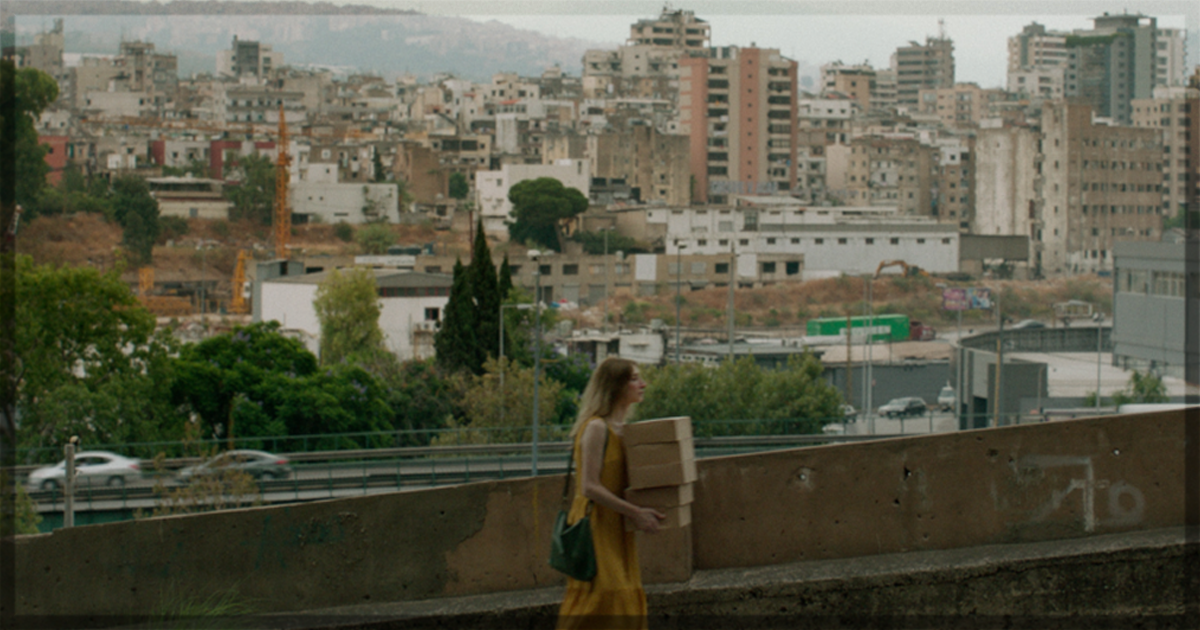Imitation is the sincerest form of flattery. In Mira Shaib’s Beirut-set drama, Arzé, the narrative framework that is imitated is that of Bicycle Thieves, a pantheonic piece of Italian neorealism. Vittorio De Sica’s 1948 classic follows a father and his son searching for a stolen bike, a symbol of means for him to earn a living. Shaib’s directorial debut parses this plot into contemporary Lebanon, following a mother and her son in the search for a stolen motorbike. Much like the bicycle is a symbol of the proletariat, a rugged, janky piece of machinery that assists in economic survival, the red motorbike at the heart of Arze’s narrative will help Arze (Diamond Abou Abboud) and son Kinan (Bilal Al Hamwi) fulfil their economic dream.
In sectarian Lebanon, Arze and her agoraphobic sister Layla (Betty Taoutel) make a living selling spinach pies – lovingly sold under the moniker of a Kinan Snack – but Kinan can’t deliver the pies with enough expediency, his own two feet just not enough. In a move that is exactly the kind of malleable morality that Arzé plays with, the titular protagonist pawns a bracelet belonging to her sister for the down payment on a scooter. The scooter is gifted to Kinan for his deliveries, but the 18-year-old uses it to travel to his friend’s house, promptly leaving it outside, and the scooter is soon stolen away.
But while the insouciant Kinan, a rebellious teenager who has just about cobbled together enough money to buy a passport, has distractions that take him away from his mother’s business – debatably selfish ideas on immigrating away from Beirut, that his delivery boy job is threatening his relationship with his girlfriend, and the search for long-departed father – the blame for losing the scooter can’t really be levied at Kinan as the city on display in Shaib’s film is painted in moral multicolor. The sectarian state is separated into different sects and religions, but it is also split by ethics. An undercurrent of criminality is suffused throughout the film as Arze and Kinan search for the scooter, while a streak of humanity is maintained within the populous, some of whom drop their lives to search for a missing person.
What is so striking about Arzé, and what differentiates and politically expands it from its Italian-neorealist inspiration, is how Arze goes about her search. Arze, played by Abboud with a fervid fire in her soul, is forced into assimilating to the different sections of Beirut. This is after her search is initially curtailed by her religious identity, one of Greek Orthodox. That her investigation into the stolen bike can only make headway when she changes accent and religious decoration is an indictment of a culture that is separated, where her mission to retrieve something stolen is disregarded because of personal religious beliefs.
But where Lebanon is divided by morals and religion, it finds itself bonded by Arze’s spinach pies, of which she uses as a form of currency, a bargaining chip for information. Director Shaib is too reserved on this element, though, as the finale only tickles the idea that her journey around Beirut became a marketing tool for her pies, limiting the emotional catharsis one can have with this aspect.
In one of the more comical scenes of this drama, Arze purchases a cross for her rescue mission and returns it to the exasperated shopkeeper for an exchange of different religious garbs multiple times. The scene heralds an uncouth tone switch that the film can’t quite work with, moving from an exasperated naturalistic portrayal of fractured society to light drama, where it’s more jovial, upbeat finale only serves to reinforce just how perfect that original despondent choice made in Bicycle Thieves is. There is an obvious fury at how the splintered society of Lebanon fosters criminality and division, but this anger is depreciated by Arze’s hopeful idealism. That being said, the choices made by Arze in this more hopeful finale foster an intriguing sentiment, where both Kinan and Arze’s moral divide must be broached to achieve anything in a society that rewards it. If anything, it’s a contemporary reflection on the denouement of Bicycle Thieves as a showcase to how society has deteriorated.
While it can’t quite fixate on which tone it wants to go for, Shaib’s astute, lean direction and vibrant, lived-in characters make Arzé a very rewarding experience. Abboud specifically is spellbinding as the titular character, while first-time actor Hamwi is a delight as the rebellious, emotionally forthright Kinan. As far as directorial debuts go, Shaib has stamped her mark with the striking Arzé as a director with vast potential, and will be one to watch when she can shake the flaky crumbs of debut filmmaking off.
Arzé recently screened at the Tribeca Film Festival.
Learn more about the film at the Tribeca website for the title.


